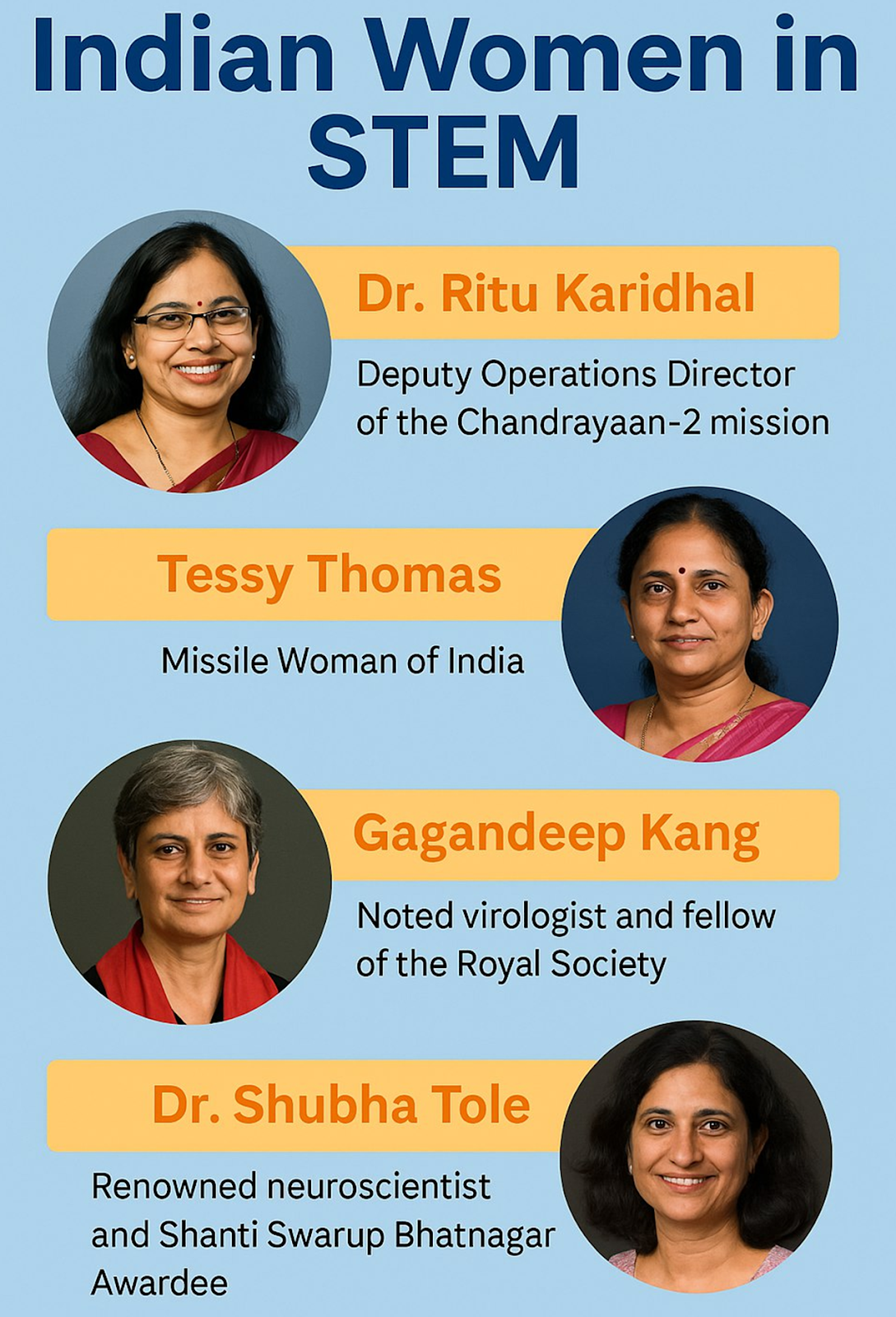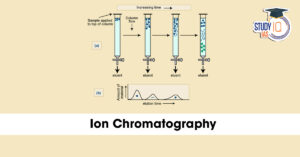Table of Contents
Context: As we mark World Youth Skills Day on July 15, India needs to work on eliminating the gender paradox in India’s STEM sector.
India has taken steps like quotas and special schemes to increase women’s participation in Science, Technology, Engineering, and Mathematics (STEM) education. However, social pressures, institutional hurdles, and cultural attitudes still prevent women from achieving equal representation.
Current Status of Women in STEM in India
- Overall representation: Women constitute 43% of total STEM graduates in India (AISHE 2020–21), one of the highest globally.
- In 2024, a record 13 lakh Class 12 girls passed with science subjects from 25.58 lakh in 2023 and 23.3 lakh in 2022.
- Research workforce: Despite high graduation rates, women make up only 14% of India’s R&D workforce (DST data, 2023).
- According to UNESCO, globally, women form just 35% of STEM graduates, with minimal change over the past decade.
- Female faculty in STEM across 98 institutions is a mere 5%, with engineering being the lowest at 9.2%
- IITs and engineering:
- Female enrolment stagnates at ~20% in IITs despite the supernumerary quota introduced in 2018.
- Absolute numbers increased (16,053 in 2020 → 18,168 in 2025), but proportional growth is flat.
- Medicine vs Engineering: In medical education, women students now outnumber men (NMC data), but engineering admissions continue to show a skew.

Importance of Women’s Participation in STEM Careers
- Demographic Dividend: Women form nearly half of India’s population. Tapping into this talent pool is essential for sustainable growth.
- Boost to GDP: According to McKinsey Global Institute, enabling 68 million more women to work could add $700 billion to India’s GDP by 2025. The World Bank estimates that a 50% female labour force participation rate could raise GDP growth by 1%.
- Innovation & Diversity: Diverse teams in STEM drive better problem-solving and innovation, vital for India’s digital and technological aspirations.
- Social Empowerment: Economic empowerment leads to greater decision-making power for women, impacting households, communities, and policymaking.
- Aligning with National Goals: Women’s inclusion in STEM aligns with the vision of Viksit Bharat, making development inclusive, equitable, and future-ready.
Challenges Faced by Women in STEM Careers
- Education-Employment Disconnect: Despite high enrolment in STEM courses, limited job transitions occur due to a lack of industry readiness, networks, or supportive policies.
- Eg., while 43% of India’s STEM graduates are women—the highest among major economies—only 27% of the STEM workforce comprises women.
- Workplace Gender Bias: Technical roles are often perceived as “masculine”, and workplaces remain unwelcoming or inflexible towards women’s life stages (e.g., maternity, caregiving).
- Urban-Rural Divide: As per PLFS 2023–24, urban FLFPR remains low at 4%, showing formal job barriers despite rising rural participation (47.6%).
- Lack of Support Systems: Mentoring, awareness, and family support are missing, especially in conservative and rural communities.
- Safety and Mobility Concerns: Inadequate transport, workplace safety, and sanitation facilities deter women from entering or staying in technical roles.
Social and Cultural Barriers
- Gender stereotypes: The Perception that boys are better at mathematics and technical subjects discourages girls.
- Family expectations: Girls are often steered towards “safe” fields like medicine or the humanities.
- Patriarchal mindsets: Social norms undervalue women in technical careers.
Institutional Challenges
- Male-dominated environments: Engineering campuses like IITs often have poor gender ratios, creating a sense of isolation.
- Inadequate infrastructure: Limited hostels, poor washroom facilities, and unsafe recreational spaces.
- Lack of mentorship: Few women role models in faculty positions; only 18% of full professors in STEM are women (AISHE, 2021).
Structural Issues
- Leaky pipeline: High numbers of women graduate in STEM but drop out during postgraduate, doctoral, and workforce stages.
- Work-life balance pressures: Career breaks due to caregiving responsibilities reduce women’s participation in R&D.
- Bias in hiring and promotions: Studies by NITI Aayog (2022) highlight systemic gender bias in recruitment and leadership roles.
Impact of Low Enrolment and Retention of Women in STEM
- Wasted human capital: With India producing over 5 million engineering graduates annually, excluding half the population reduces potential talent.
- Innovation deficit: Diversity leads to better innovation; underrepresentation of women narrows perspectives.
- Economic cost: The World Bank estimates that India’s GDP could rise by 27% if women participated in the workforce at par as men.
- Global competitiveness: Countries like China and South Korea leverage gender-inclusive STEM education for industrial growth.
- Social impact: Absence of women scientists reduces visible role models, perpetuating stereotypes for the next generation.
| What National Institutes Are Doing to Increase Enrollment |
|
Government Schemes Promoting Women in STEM
- Vigyan Jyoti (2019): Implemented by the Department of Science & Technology (DST).
- Targets Class IX–XII girls from underrepresented districts.
- Provides exposure visits to IITs, NITs, and IISERs; mentoring by women scientists.
- UDAAN (CBSE initiative): Provides free online resources, mentoring, and financial support for girl students preparing for engineering entrance exams.
- GATI (Gender Advancement for Transforming Institutions): Pilot programme in 30 institutions to promote gender equity in STEM academia.
- Inspired by the UK’s Athena Swan Charter.
- WISE (Women in Science and Engineering) Fellowship: Supports women scientists in re-entering careers after breaks.
- INSPIRE Scholarships: Provides scholarships for meritorious students (including girls) in natural sciences.
Solutions & Way Forward
- School-Level Reforms:
- Reform pedagogy to challenge gender stereotypes
- Showcase women scientists in curricula (e.g., Kalpana Chawla, Gagandeep Kang).
- Encourage girls to tinker and innovate through Atal Tinkering Labs.
- Campus and Institutional Changes:
- Ensure inclusive infrastructure: safe hostels, adequate washrooms, gender-neutral recreational spaces.
- Mandatory gender sensitisation workshops for students and faculty.
- Strengthen mentorship and alumni networks to guide young women.
- Policy Strengthening and Targeted Interventions: NEP 2020 integrates life skills and vocational education training.
- Union Budget 2025–26 increased the gender budget to 8% and introduced term loans, National Skill Training Institutes, and digital skilling platforms.
- Strengthen the implementation of GATI and expand it nationwide.
- Introduce mandatory gender audits in national institutes.
- Industry as a Change Agent: Industries must shift from being passive recruiters to active enablers through mentoring, internships, and workplace reform.
- Partnering with educational institutions to create classroom-to-career pipelines.
- Community Engagement & Behavioural Change: Initiatives like UN Women’s WeSTEM Programme engage families, promote female role models, and conduct workplace safety sessions to change mindsets.
- Public campaigns showcasing women role models in STEM (e.g., ISRO women leading Mangalyaan and Chandrayaan).
- Encourage families to support girls in pursuing technical education.
- Infrastructure & Safety Enhancements: Safe transport, flexible workspaces, and gender-sensitive policies are crucial to retain women in STEM fields.
- Awareness & Mentorship: Launch national mentorship networks, industry bootcamps, and career counselling to improve confidence and visibility of opportunities.
- Workforce Retention:
- Flexible work policies and childcare facilities in academia and R&D labs.
- Expand fellowships for women returning to research after career breaks.


 Advanced Air Defence Radars: Types, Comp...
Advanced Air Defence Radars: Types, Comp...
 Ion Chromatography, Working and Applicat...
Ion Chromatography, Working and Applicat...
 Broadly Neutralising Antibodies (bNAbs):...
Broadly Neutralising Antibodies (bNAbs):...

























